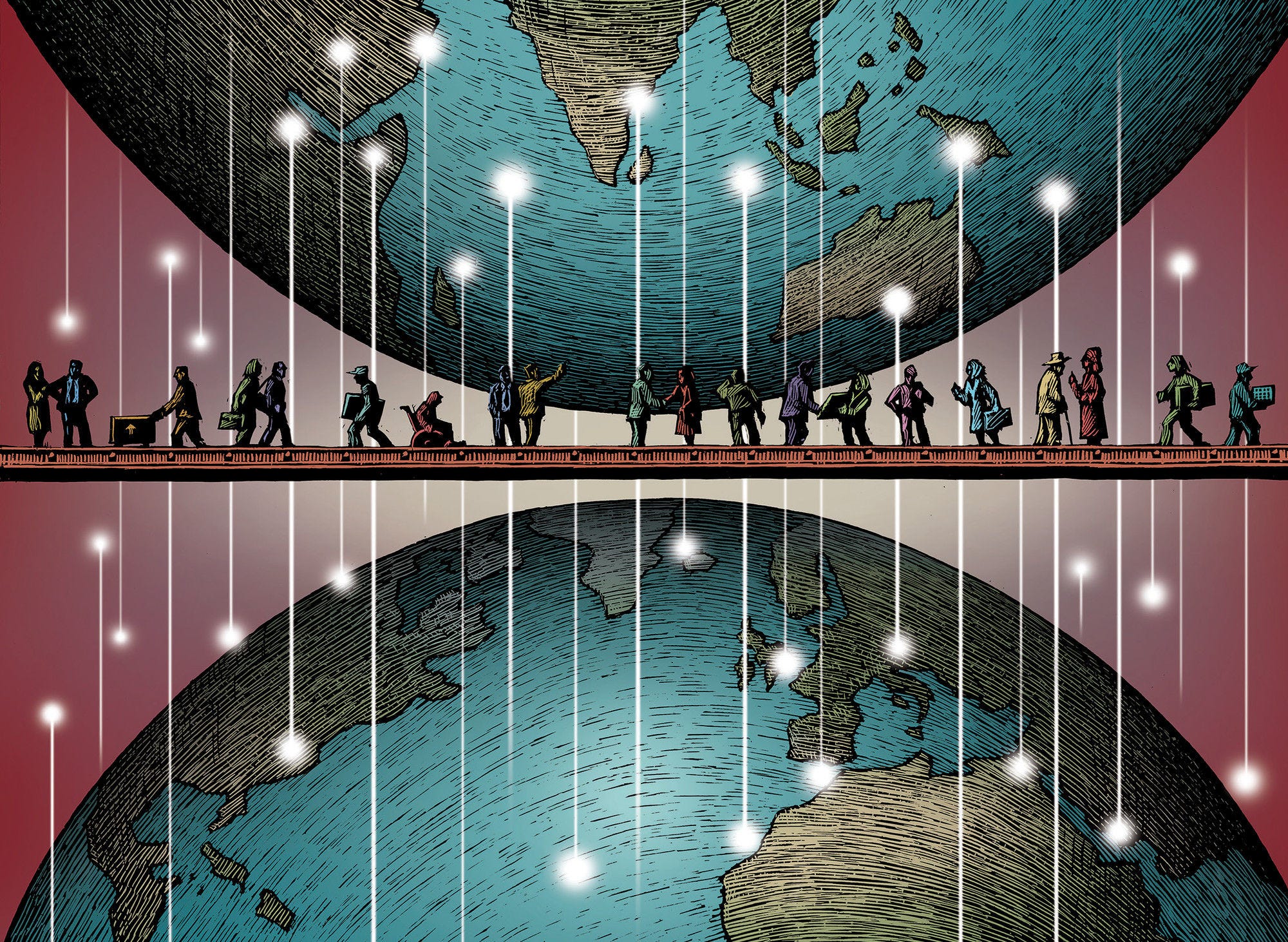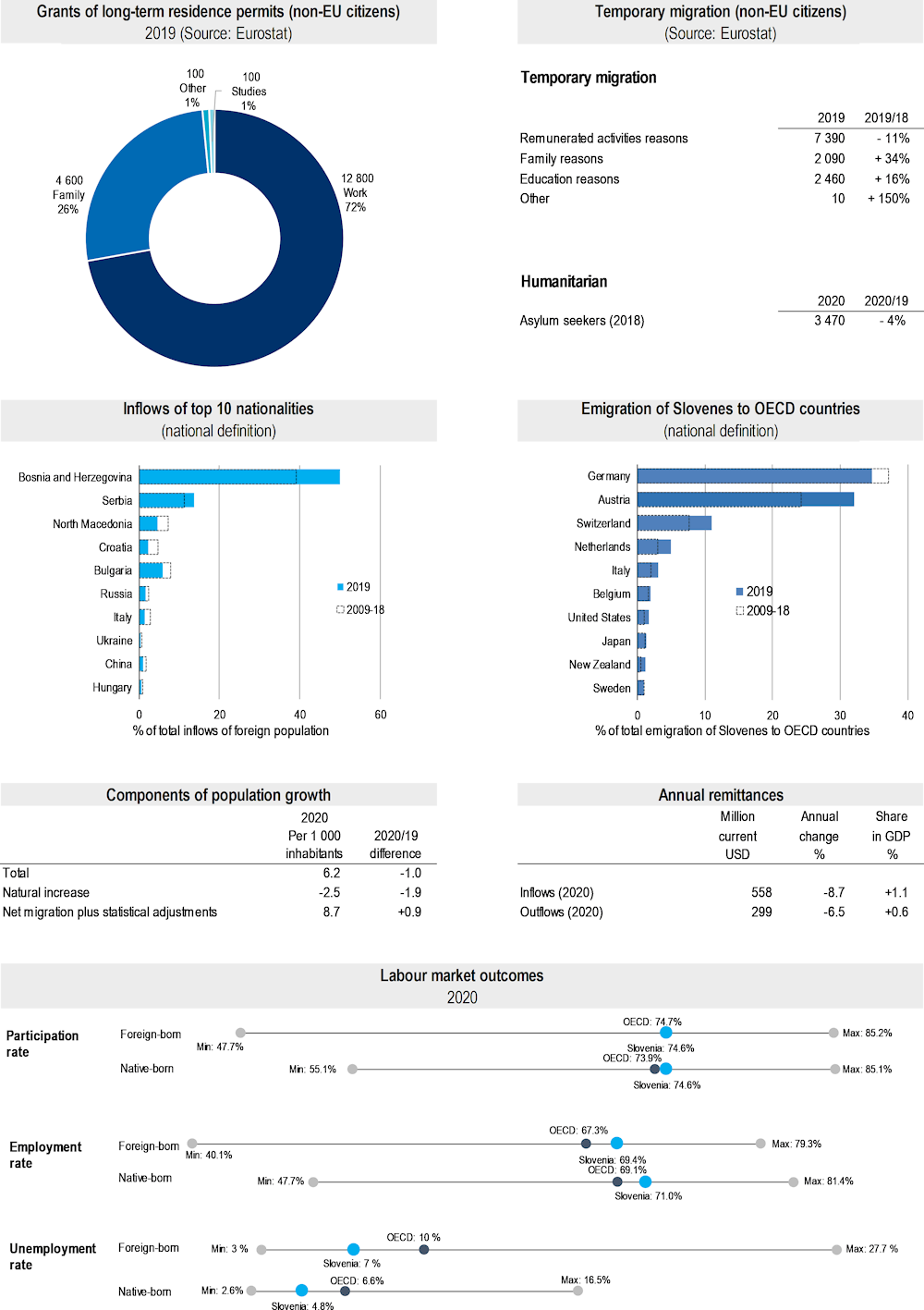In 2019, 20 000 new immigrants obtained a residence permit longer than 12 months in Slovenia (excluding EU citizens), 10.7% more than in 2018. This figure comprises 66.3% labour migrants, 32% family members (including accompanying family), 0.9% who came for education reasons and 0.8% other migrants. Around 2 500 short-term permits were issued to international students and 7 400 to temporary and seasonal labour migrants (excluding intra-EU migration). In addition, 17 000 intra-EU postings were recorded in 2019, an increase of 88% compared to 2018. These posted workers are generally on short-term contracts.
Bosnia and Herzegovina, Serbia and North Macedonia were the top three nationalities of newcomers in 2019. Among the top 15 countries of origin, Bosnia and Herzegovina registered the strongest increase (2 100) and Russia the largest decrease (‑94) in flows to Slovenia compared to the previous year.
In 2020, the number of first asylum applicants decreased by ‑4.1%, to reach around 3 500. The majority of applicants came from Morocco (1 200), Afghanistan (700) and Pakistan (500). The largest increase since 2019 concerned nationals of Morocco (500) and the largest decrease nationals of Algeria (‑700). Of the 300 decisions taken in 2020, 28.3% were positive.
Slovenia is an important transit country; most migrants trying to reach western European countries from Turkey use either the central route via Serbia or the route stemming from the Greek-Albanian border, along the Bosnian and Herzegovinian – Croatian – Slovenian corridor. As such, Slovenia took several measures to reinforce border surveillance. New surveillance capabilities have been installed and enhanced IT support provided for border checks.
Regarding asylum, the AMIF project, which entitled all asylum seekers to free legal advice and representation through the asylum procedure, terminated in late April 2020. However, with the support of UNHCR, the service was continued and especially vulnerable groups benefitted from it. Moreover, due to the travel restrictions associated to the COVID‑19 pandemic, Dublin transfers were de facto suspended. At the end of March 2021, the Slovenian National Assembly approved legislative amendments to the International Protection Act (IPA) that limit procedure abuse. Proposed by the Slovenian Ministry of Interior Affairs, the law includes measures to speed up asylum procedures and sanctions for applicants who violate rules and laws. In accordance with the Reception Conditions Directive, applicants may move freely on the Slovenian territory in order to exercise specific rights. Otherwise, their movement is restricted to the municipality of temporary residence. In December 2020, the government adopted the Act that provides more efficient and faster international protection procedures and to improve integration of people with international protection. However, 80% of asylum procedures ended primarily because applicants left Slovenia, which, inter alia, has an impact on recognition rate.
Apart from measures for asylum seekers, the new Foreigners Act also includes inter alia measures regarding family reunification, which requires third-country nationals to legally reside in Slovenia for two years before their family can apply for a residence permit for family reunification (with the exception of EU Blue Card holders, intra-company transferred migrant workers and those whose residence permits are issued for work in research and higher education). Another major change sets Slovenian language knowledge as a condition for the prolongation of temporary or permanent residence permits and introduces a system of periodic checks on sufficient means of subsistence. The Act also includes provisions to transpose the European Union’s Directive on students and researchers (EU 2016/801) into national law. In addition, the Act includes the implementation of the Agreement on the withdrawal of the United Kingdom from the European Union and the European Atomic Energy Community regarding residence permits (e.g. continuous right of residence in Slovenia for UK nationals with residence permits expiring after December 2020). The new Act addresses also the emergence of a complex crisis in the field of migration (e.g. major migration influx of persons asking for international protection).
In the context of the COVID‑19 crisis, Slovenia introduced special measures to address the shortage of seasonal workers in the agricultural sector and relief was provided for registered migrants to stay temporarily at the end of their permit. Until the end of May 2020 and the containment measures, third-country nationals were allowed to stay in the country. After the reopening of the borders, entry could still be refused to non-Slovenian citizens with no Slovenian residence permit and with COVID‑19 symptoms. After suspending for a month all oral hearings for international protection applicants, they resumed in May 2020 (in person). Finally, a proposal to extend the existing accommodation for unaccompanied minors in 2021 is under preparation.
For further information:

